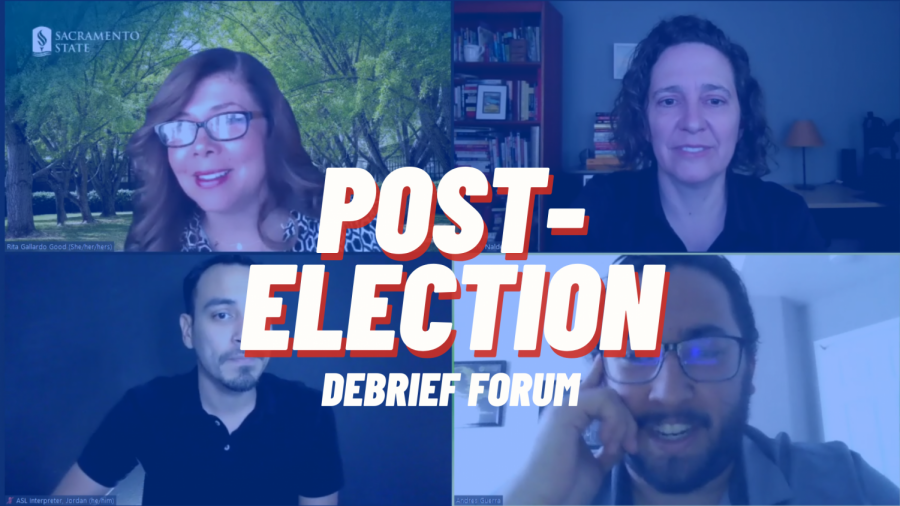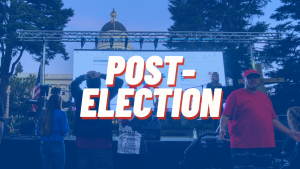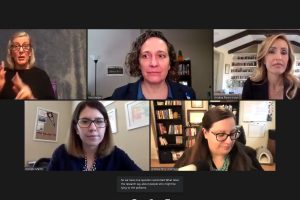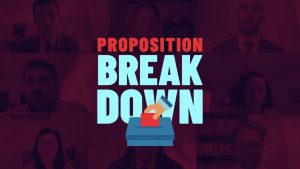Sac State hosts panel discussing 2020 election results and impacts
Sacramento State hosted a panel discussing the election with Rita Gallardo Good, Dr. Kimberly Nalder and Andres Guerra Wednesday, Nov. 4, 2020. The panel discussed the impacts of the presidential election as well as California propositions. Screenshot via Zoom taken by Colby Case.
November 4, 2020
Sacramento State hosted a forum to discuss the 2020 election and how the results impact students and the different communities in Sacramento County Wednesday via Zoom.
The panel included Sac State professors, as well as members from the Sacramento LGBT Community Center and the Coalition for Humane Immigrant Rights. The speakers covered multiple topics including the presidential election, Congress, misinformation, voter suppression and how students can be engaged in politics.
Voters are awaiting results for the presidential race, but some of the other races in the election have been called.
“Some of the states are not really accustomed to how that counting goes, and so they may be a little bit slower to get that done,” said Dr. Kimberly Nalder, a professor of political science at Sac State.
In congressional elections, Democrats were expected to gain seats in the House of Representatives. However, those seats were won by Republicans, Nalder said.
Democrats have lost five seats in the House so far, and Republicans have won six additional seats, according to the Associated Press.
“We thought there might be a big change but instead of getting better for Democrats, it’s worse in some ways for Democrats,” Nalder said.
The panel also discussed voter suppression and misinformation regarding ballot submissions.
RELATED: Sac State professors discuss misinformation in the 2020 election
“We’ve been told that fraud is rampant in mailing ballots, which is not true at all,” Nalder said. “The average for voter fraud is one per state per every six elections, one instance. So it’s almost non-existent.”
Koby Rodriguez, the chief program officer at the Sacramento LGBT Community Center, said that voter suppression isn’t new.
“But in the middle of a dual pandemic, one for COVID and one against Black lives, the tactics have shifted a little bit,” Rodriguez said. “Anything that is done to get folks to avoid voting is voter suppression, and we have to create stricter laws that don’t allow for these things to happen.”
Despite this, there have been a record number of U.S. voters, said Andres Guerra, a supervisor at the Coalition for Humane Immigrant Rights.
“Regardless of where you are on the political spectrum, the healthy voter turnout is something that’s generally a good thing,” Guerra said.
The panel also discussed Proposition 16, which did not pass in California. The proposition would have allowed for state and local governments to consider race, sex, ethnicity and national origin in public employment hiring and in public education admissions.
“It’s troubling that a lot of gains that have been made historically are constantly being challenged and then we have to continue to fight for those,” said Dana Kivel, an associate professor in the department of recreation, parks and tourism administration. “This particular proposition not passing just leads me to think more about the role that we have to play at the university in terms of educating for and discussing civic engagement.”
Guerra said that Prop 16 not passing is unfortunate, but a decision likely caused through the spread of misinformation.
“There’s never a situation where you can say this person will be reserved this spot at a CSU … because of their race or national origin. Rather, it’s one of the factors that gets to be considered in a pool of what I understand is at least 10 other factors,” Guerra said.
Guerra also said he predicts there will be further underrepresentation of minorities, despite evidence from across the United States that diverse economies are stronger.
Proposition 20, which would have added more crimes to the list of felonies with restricted early parole, was another topic discussed by the panel.
“Prop 20 not passing is actually good for the immigrant community, because one thing that Proposition 20 would have done is it would have expanded the categories of crimes that make people deportable,” Guerra said.
The panel expressed the importance of civic engagement to students, whether through social media, web searches or reaching out to congressional representatives.
“Figuring out what your passion is, what is it that you want to do, how do you want to lend your time, your voice, your experience and connect with the different organizations on campus,” Kivel said.
Nalder also discussed the presidential election and explained how far detached President Trump is from the election process and how little he can do to influence it.
“This president will likely put up quite a stink on Twitter, I would imagine, and use every legal power he has to try to muddy the waters and make things confusing and undermine [the] Biden presidency,” Nalder said.







































































































































